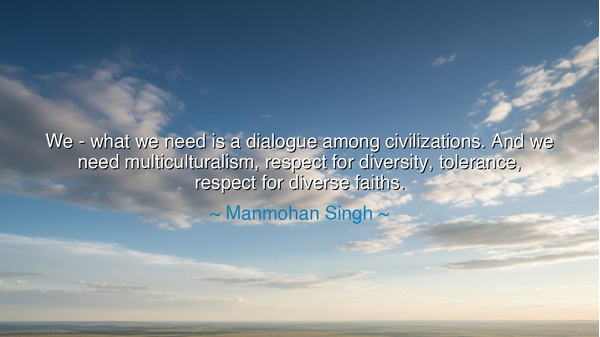
We - what we need is a dialogue among civilizations. And we need
We - what we need is a dialogue among civilizations. And we need multiculturalism, respect for diversity, tolerance, respect for diverse faiths.






The words of Manmohan Singh—“We—what we need is a dialogue among civilizations. And we need multiculturalism, respect for diversity, tolerance, respect for diverse faiths”—resonate as a call to the deepest principles of human coexistence. Spoken by a man who led India, a nation of myriad languages, religions, and traditions, Singh’s statement is a reflection on the eternal need for understanding across difference. His words remind us that peace and prosperity are not the product of domination, but of dialogue; that the greatness of a society is measured not by the uniformity it imposes, but by the breadth of its embrace.
The origin of this wisdom is deeply rooted in Singh’s experience as both a scholar and a statesman. Born in the early twentieth century, he witnessed the partition of India, the upheavals of war, and the struggles of a newly independent nation. These events revealed a painful truth: when civilizations isolate themselves, misunderstanding flourishes, and conflict becomes inevitable. Singh’s advocacy for multiculturalism was not abstract idealism—it arose from decades of witnessing the human cost of intolerance. In calling for dialogue among civilizations, he calls for the bridges of empathy to replace the walls of fear.
This principle echoes the wisdom of the ancients. The Greek historian Herodotus chronicled the clashes of Persia and Greece not only to recount battles, but to illustrate the richness of cultural exchange and the folly of arrogance. The philosopher Confucius taught that harmony arises not from sameness, but from each respecting the role and virtue of the other. Singh’s plea for respect for diversity and tolerance is a modern expression of this timeless lesson: that civilizations flourish when they converse, not when they conquer. Dialogue is the crucible in which understanding is forged, and understanding is the foundation of enduring peace.
Consider the historical example of Cordoba in the 10th century, where Muslims, Christians, and Jews lived side by side, sharing knowledge, art, and philosophy. In this multicultural city, scholars translated texts from Greek, Sanskrit, and Arabic; poets and philosophers debated under the same skies. Out of diversity came enlightenment and innovation. Singh’s words remind us that such flourishing is not accidental—it requires conscious respect, structured dialogue, and willingness to embrace difference. Where tolerance is absent, the city falls; where dialogue ceases, knowledge stagnates and conflict arises.
Singh’s mention of “respect for diverse faiths” carries profound moral weight. Religion, the oldest marker of human identity, has often been a source of division and violence. Yet Singh asks us to see faith not as a weapon of exclusion, but as a window into the soul of another people. By practicing respect, we acknowledge the shared humanity behind the symbols and rituals of each tradition. In a world riven by sectarian strife, his words are a reminder that faith becomes a bridge rather than a barrier when approached with humility and curiosity.
In the modern context, multiculturalism is not merely a political policy, but a moral imperative. Societies that honor diversity—through law, through education, and through culture—build resilience against hatred and ignorance. Dialogue among civilizations is not the luxury of the strong, but the necessity of survival. Singh’s words remind us that it is not enough to tolerate difference passively; one must engage actively, learn continually, and respect courageously. Only then can civilizations meet on common ground without erasing the uniqueness that defines them.
The lesson of Manmohan Singh’s words is clear: the survival and flourishing of humanity depend on our ability to converse across divides, to celebrate difference, and to honor the beliefs of others while maintaining our own. Hatred, isolation, and arrogance breed only destruction. Respect, curiosity, and dialogue breed understanding, collaboration, and peace. Every individual, in communities large and small, can carry forward this principle through openness, active listening, and empathy.
So, my child, remember this in your walk through the world: do not fear the unfamiliar, nor scorn what differs from your own experience. Seek to understand, to learn, and to converse. Let your heart be wide enough to hold the stories of many civilizations, and your mind open enough to hear their wisdom. For it is in dialogue, in respect, and in the celebration of diversity that we create a world not of conflict, but of shared prosperity and enduring harmony.






AAdministratorAdministrator
Welcome, honored guests. Please leave a comment, we will respond soon